Hospitality Industry: Environmental Practices at Aqua Resort Report
VerifiedAdded on 2021/04/17
|10
|2211
|64
Report
AI Summary
This report provides a comprehensive overview of the environmental practices implemented at Aqua Resort Busselton, a luxury hotel in Australia. It delves into water consumption management, highlighting the installation of water meters, shower flow restrictions, and regular audits to identify areas for savings. The report also discusses waste reduction, reuse, and recycling strategies, including staff training, green packaging, and composting initiatives. It identifies aspects not complying with environmentally friendly practices, such as increased consumption and improper waste disposal. Furthermore, the report outlines a staffing program to improve waste management and promote a greener environment, including step-by-step implementation. It also details environmental hazards, such as improper waste disposal and energy inefficiencies, and suggests improvements like the NABERS rating system and the use of electronic taps. Finally, the report explores green changes within the hospitality industry, including environmental education and the adoption of sustainable development principles, and emphasizes the importance of environmental management systems to overcome environmental hazards, promoting eco-tourism, and enhancing staff skills.
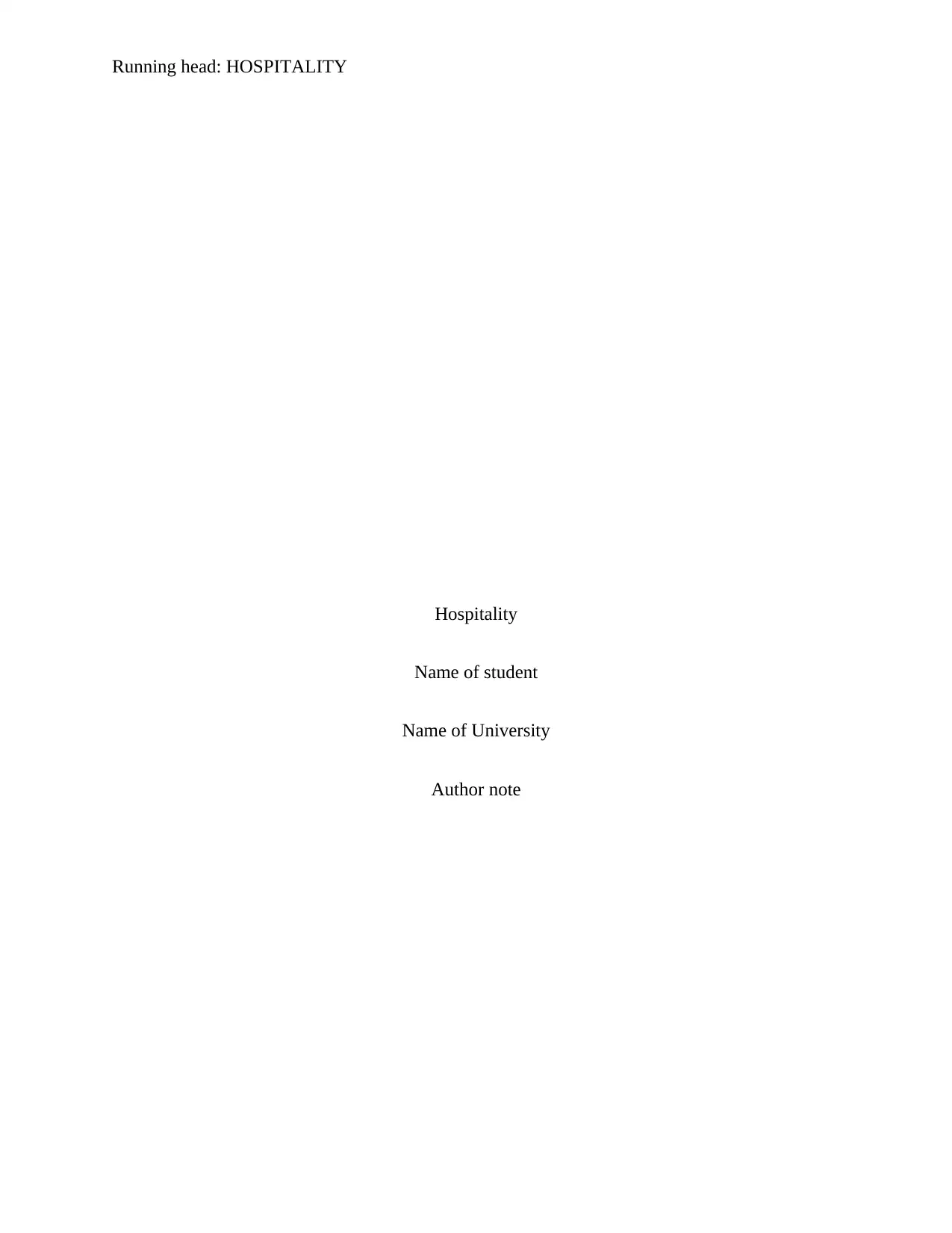
Running head: HOSPITALITY
Hospitality
Name of student
Name of University
Author note
Hospitality
Name of student
Name of University
Author note
Paraphrase This Document
Need a fresh take? Get an instant paraphrase of this document with our AI Paraphraser
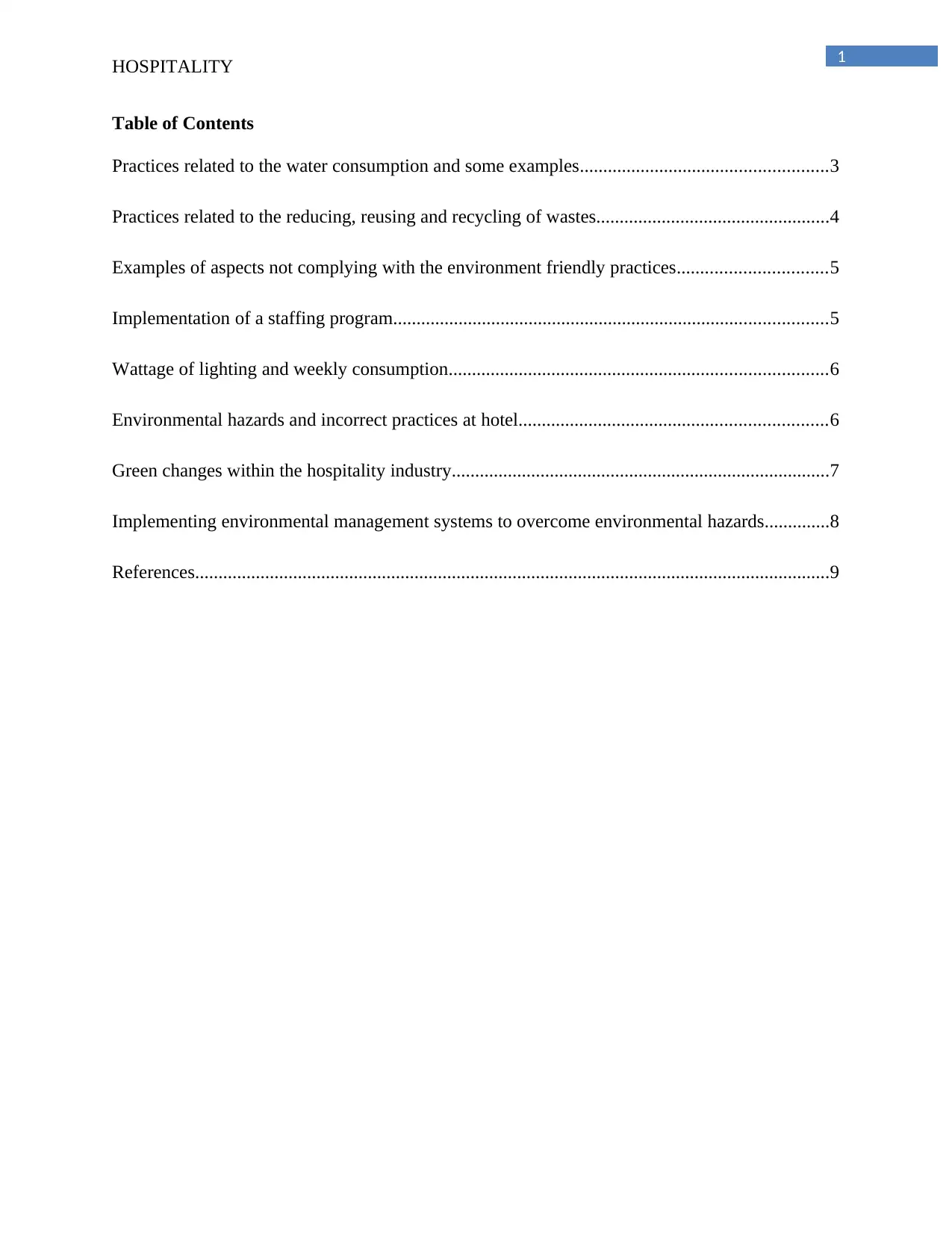
1
HOSPITALITY
Table of Contents
Practices related to the water consumption and some examples.....................................................3
Practices related to the reducing, reusing and recycling of wastes..................................................4
Examples of aspects not complying with the environment friendly practices................................5
Implementation of a staffing program.............................................................................................5
Wattage of lighting and weekly consumption.................................................................................6
Environmental hazards and incorrect practices at hotel..................................................................6
Green changes within the hospitality industry.................................................................................7
Implementing environmental management systems to overcome environmental hazards..............8
References........................................................................................................................................9
HOSPITALITY
Table of Contents
Practices related to the water consumption and some examples.....................................................3
Practices related to the reducing, reusing and recycling of wastes..................................................4
Examples of aspects not complying with the environment friendly practices................................5
Implementation of a staffing program.............................................................................................5
Wattage of lighting and weekly consumption.................................................................................6
Environmental hazards and incorrect practices at hotel..................................................................6
Green changes within the hospitality industry.................................................................................7
Implementing environmental management systems to overcome environmental hazards..............8
References........................................................................................................................................9
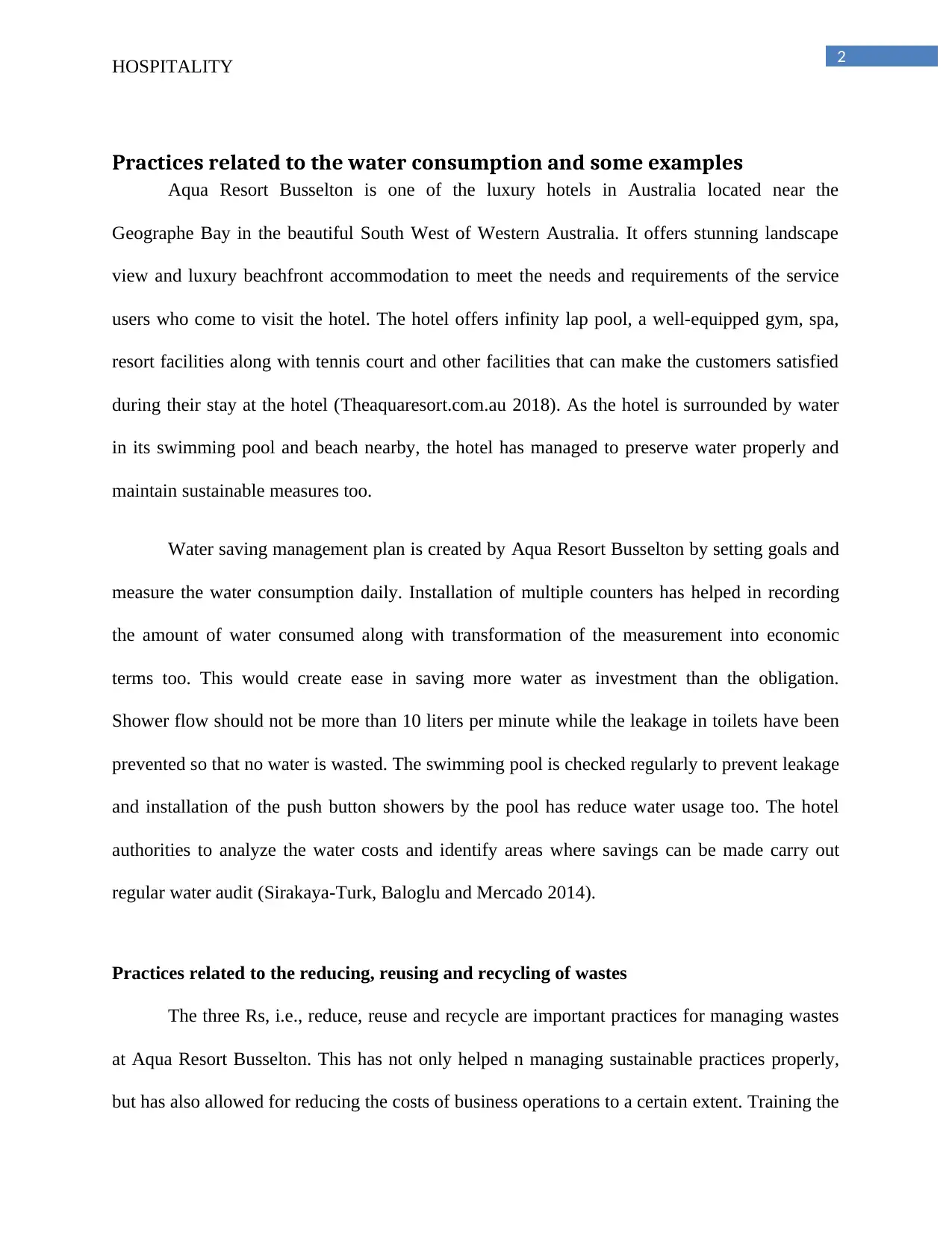
2
HOSPITALITY
Practices related to the water consumption and some examples
Aqua Resort Busselton is one of the luxury hotels in Australia located near the
Geographe Bay in the beautiful South West of Western Australia. It offers stunning landscape
view and luxury beachfront accommodation to meet the needs and requirements of the service
users who come to visit the hotel. The hotel offers infinity lap pool, a well-equipped gym, spa,
resort facilities along with tennis court and other facilities that can make the customers satisfied
during their stay at the hotel (Theaquaresort.com.au 2018). As the hotel is surrounded by water
in its swimming pool and beach nearby, the hotel has managed to preserve water properly and
maintain sustainable measures too.
Water saving management plan is created by Aqua Resort Busselton by setting goals and
measure the water consumption daily. Installation of multiple counters has helped in recording
the amount of water consumed along with transformation of the measurement into economic
terms too. This would create ease in saving more water as investment than the obligation.
Shower flow should not be more than 10 liters per minute while the leakage in toilets have been
prevented so that no water is wasted. The swimming pool is checked regularly to prevent leakage
and installation of the push button showers by the pool has reduce water usage too. The hotel
authorities to analyze the water costs and identify areas where savings can be made carry out
regular water audit (Sirakaya-Turk, Baloglu and Mercado 2014).
Practices related to the reducing, reusing and recycling of wastes
The three Rs, i.e., reduce, reuse and recycle are important practices for managing wastes
at Aqua Resort Busselton. This has not only helped n managing sustainable practices properly,
but has also allowed for reducing the costs of business operations to a certain extent. Training the
HOSPITALITY
Practices related to the water consumption and some examples
Aqua Resort Busselton is one of the luxury hotels in Australia located near the
Geographe Bay in the beautiful South West of Western Australia. It offers stunning landscape
view and luxury beachfront accommodation to meet the needs and requirements of the service
users who come to visit the hotel. The hotel offers infinity lap pool, a well-equipped gym, spa,
resort facilities along with tennis court and other facilities that can make the customers satisfied
during their stay at the hotel (Theaquaresort.com.au 2018). As the hotel is surrounded by water
in its swimming pool and beach nearby, the hotel has managed to preserve water properly and
maintain sustainable measures too.
Water saving management plan is created by Aqua Resort Busselton by setting goals and
measure the water consumption daily. Installation of multiple counters has helped in recording
the amount of water consumed along with transformation of the measurement into economic
terms too. This would create ease in saving more water as investment than the obligation.
Shower flow should not be more than 10 liters per minute while the leakage in toilets have been
prevented so that no water is wasted. The swimming pool is checked regularly to prevent leakage
and installation of the push button showers by the pool has reduce water usage too. The hotel
authorities to analyze the water costs and identify areas where savings can be made carry out
regular water audit (Sirakaya-Turk, Baloglu and Mercado 2014).
Practices related to the reducing, reusing and recycling of wastes
The three Rs, i.e., reduce, reuse and recycle are important practices for managing wastes
at Aqua Resort Busselton. This has not only helped n managing sustainable practices properly,
but has also allowed for reducing the costs of business operations to a certain extent. Training the
⊘ This is a preview!⊘
Do you want full access?
Subscribe today to unlock all pages.

Trusted by 1+ million students worldwide
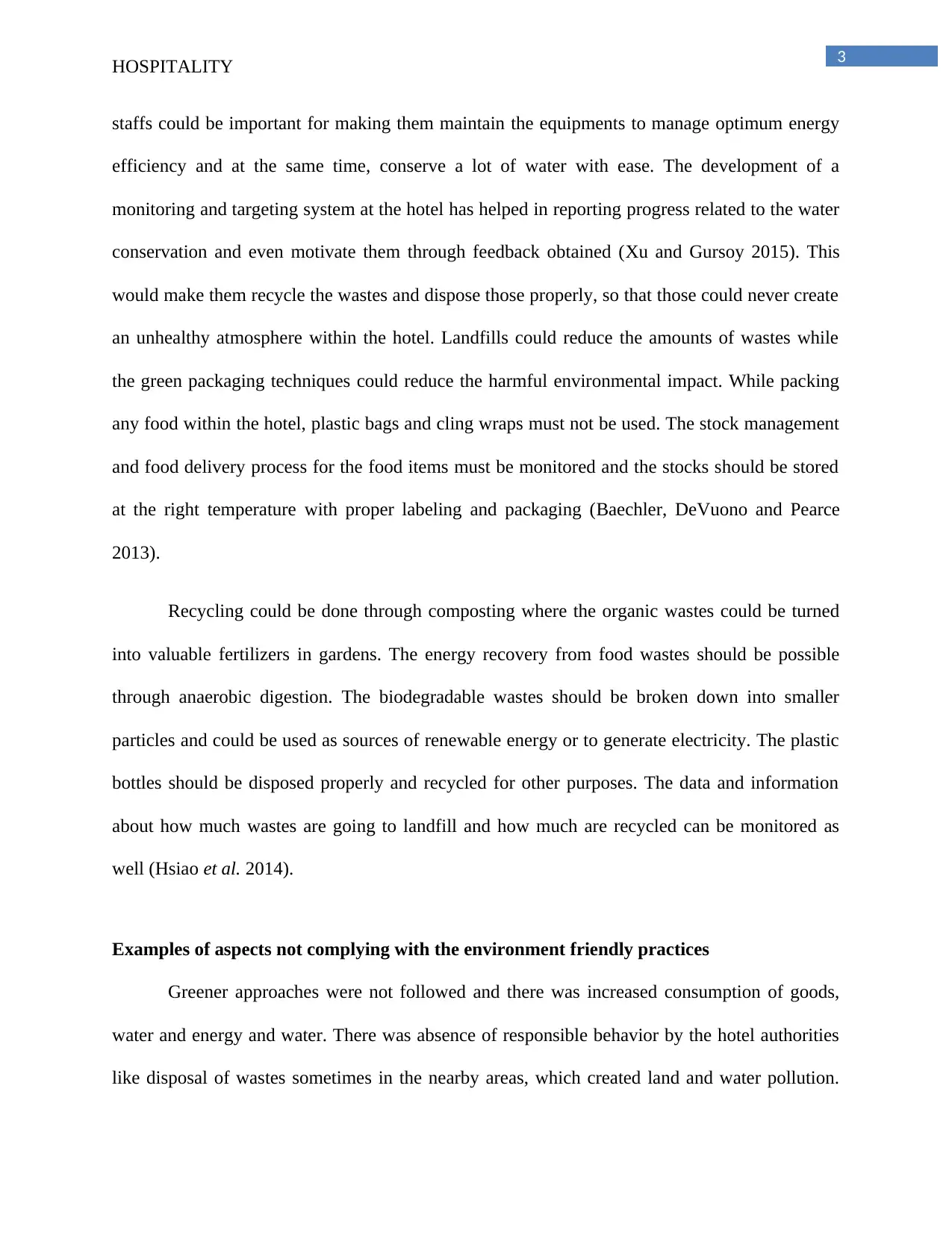
3
HOSPITALITY
staffs could be important for making them maintain the equipments to manage optimum energy
efficiency and at the same time, conserve a lot of water with ease. The development of a
monitoring and targeting system at the hotel has helped in reporting progress related to the water
conservation and even motivate them through feedback obtained (Xu and Gursoy 2015). This
would make them recycle the wastes and dispose those properly, so that those could never create
an unhealthy atmosphere within the hotel. Landfills could reduce the amounts of wastes while
the green packaging techniques could reduce the harmful environmental impact. While packing
any food within the hotel, plastic bags and cling wraps must not be used. The stock management
and food delivery process for the food items must be monitored and the stocks should be stored
at the right temperature with proper labeling and packaging (Baechler, DeVuono and Pearce
2013).
Recycling could be done through composting where the organic wastes could be turned
into valuable fertilizers in gardens. The energy recovery from food wastes should be possible
through anaerobic digestion. The biodegradable wastes should be broken down into smaller
particles and could be used as sources of renewable energy or to generate electricity. The plastic
bottles should be disposed properly and recycled for other purposes. The data and information
about how much wastes are going to landfill and how much are recycled can be monitored as
well (Hsiao et al. 2014).
Examples of aspects not complying with the environment friendly practices
Greener approaches were not followed and there was increased consumption of goods,
water and energy and water. There was absence of responsible behavior by the hotel authorities
like disposal of wastes sometimes in the nearby areas, which created land and water pollution.
HOSPITALITY
staffs could be important for making them maintain the equipments to manage optimum energy
efficiency and at the same time, conserve a lot of water with ease. The development of a
monitoring and targeting system at the hotel has helped in reporting progress related to the water
conservation and even motivate them through feedback obtained (Xu and Gursoy 2015). This
would make them recycle the wastes and dispose those properly, so that those could never create
an unhealthy atmosphere within the hotel. Landfills could reduce the amounts of wastes while
the green packaging techniques could reduce the harmful environmental impact. While packing
any food within the hotel, plastic bags and cling wraps must not be used. The stock management
and food delivery process for the food items must be monitored and the stocks should be stored
at the right temperature with proper labeling and packaging (Baechler, DeVuono and Pearce
2013).
Recycling could be done through composting where the organic wastes could be turned
into valuable fertilizers in gardens. The energy recovery from food wastes should be possible
through anaerobic digestion. The biodegradable wastes should be broken down into smaller
particles and could be used as sources of renewable energy or to generate electricity. The plastic
bottles should be disposed properly and recycled for other purposes. The data and information
about how much wastes are going to landfill and how much are recycled can be monitored as
well (Hsiao et al. 2014).
Examples of aspects not complying with the environment friendly practices
Greener approaches were not followed and there was increased consumption of goods,
water and energy and water. There was absence of responsible behavior by the hotel authorities
like disposal of wastes sometimes in the nearby areas, which created land and water pollution.
Paraphrase This Document
Need a fresh take? Get an instant paraphrase of this document with our AI Paraphraser
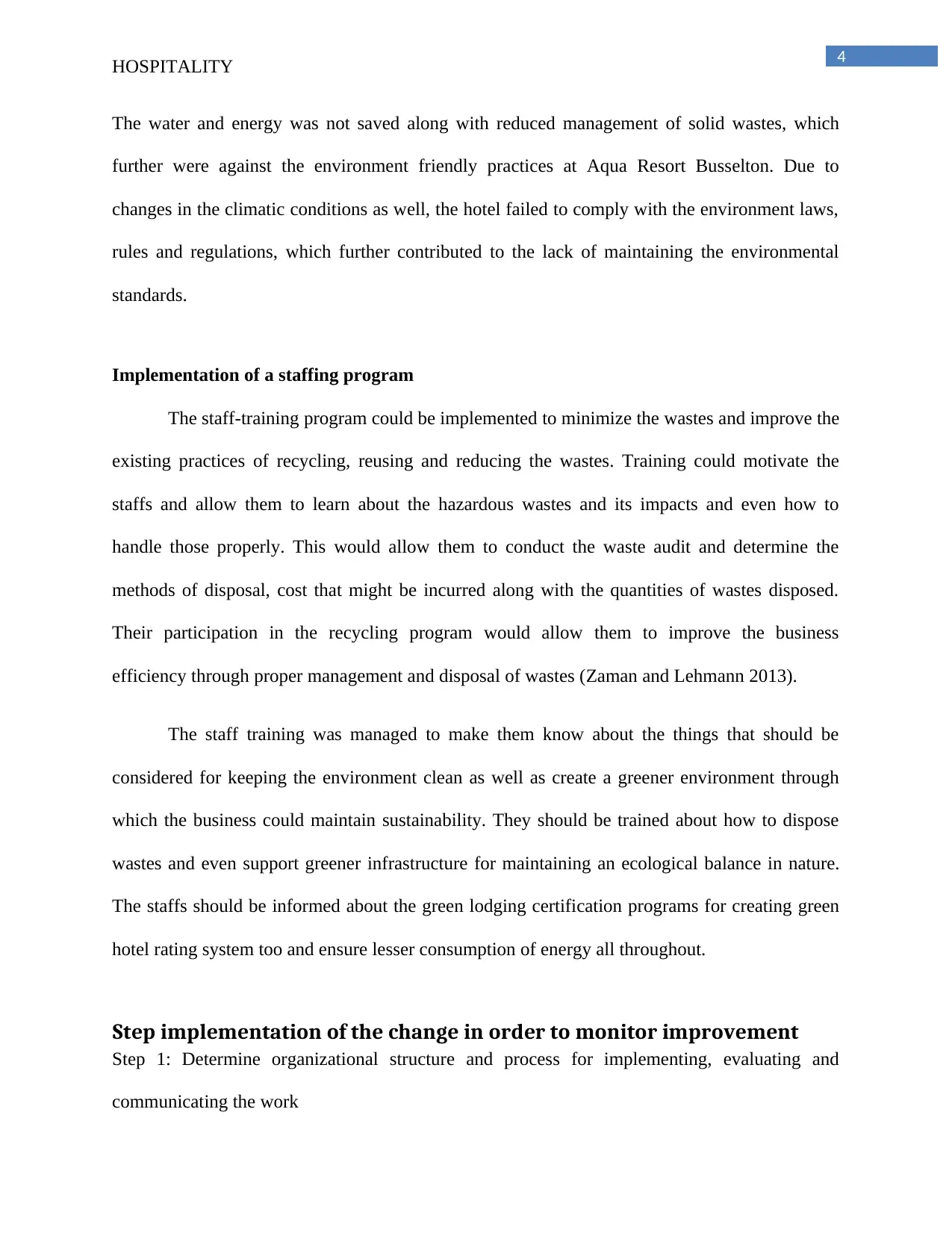
4
HOSPITALITY
The water and energy was not saved along with reduced management of solid wastes, which
further were against the environment friendly practices at Aqua Resort Busselton. Due to
changes in the climatic conditions as well, the hotel failed to comply with the environment laws,
rules and regulations, which further contributed to the lack of maintaining the environmental
standards.
Implementation of a staffing program
The staff-training program could be implemented to minimize the wastes and improve the
existing practices of recycling, reusing and reducing the wastes. Training could motivate the
staffs and allow them to learn about the hazardous wastes and its impacts and even how to
handle those properly. This would allow them to conduct the waste audit and determine the
methods of disposal, cost that might be incurred along with the quantities of wastes disposed.
Their participation in the recycling program would allow them to improve the business
efficiency through proper management and disposal of wastes (Zaman and Lehmann 2013).
The staff training was managed to make them know about the things that should be
considered for keeping the environment clean as well as create a greener environment through
which the business could maintain sustainability. They should be trained about how to dispose
wastes and even support greener infrastructure for maintaining an ecological balance in nature.
The staffs should be informed about the green lodging certification programs for creating green
hotel rating system too and ensure lesser consumption of energy all throughout.
Step implementation of the change in order to monitor improvement
Step 1: Determine organizational structure and process for implementing, evaluating and
communicating the work
HOSPITALITY
The water and energy was not saved along with reduced management of solid wastes, which
further were against the environment friendly practices at Aqua Resort Busselton. Due to
changes in the climatic conditions as well, the hotel failed to comply with the environment laws,
rules and regulations, which further contributed to the lack of maintaining the environmental
standards.
Implementation of a staffing program
The staff-training program could be implemented to minimize the wastes and improve the
existing practices of recycling, reusing and reducing the wastes. Training could motivate the
staffs and allow them to learn about the hazardous wastes and its impacts and even how to
handle those properly. This would allow them to conduct the waste audit and determine the
methods of disposal, cost that might be incurred along with the quantities of wastes disposed.
Their participation in the recycling program would allow them to improve the business
efficiency through proper management and disposal of wastes (Zaman and Lehmann 2013).
The staff training was managed to make them know about the things that should be
considered for keeping the environment clean as well as create a greener environment through
which the business could maintain sustainability. They should be trained about how to dispose
wastes and even support greener infrastructure for maintaining an ecological balance in nature.
The staffs should be informed about the green lodging certification programs for creating green
hotel rating system too and ensure lesser consumption of energy all throughout.
Step implementation of the change in order to monitor improvement
Step 1: Determine organizational structure and process for implementing, evaluating and
communicating the work
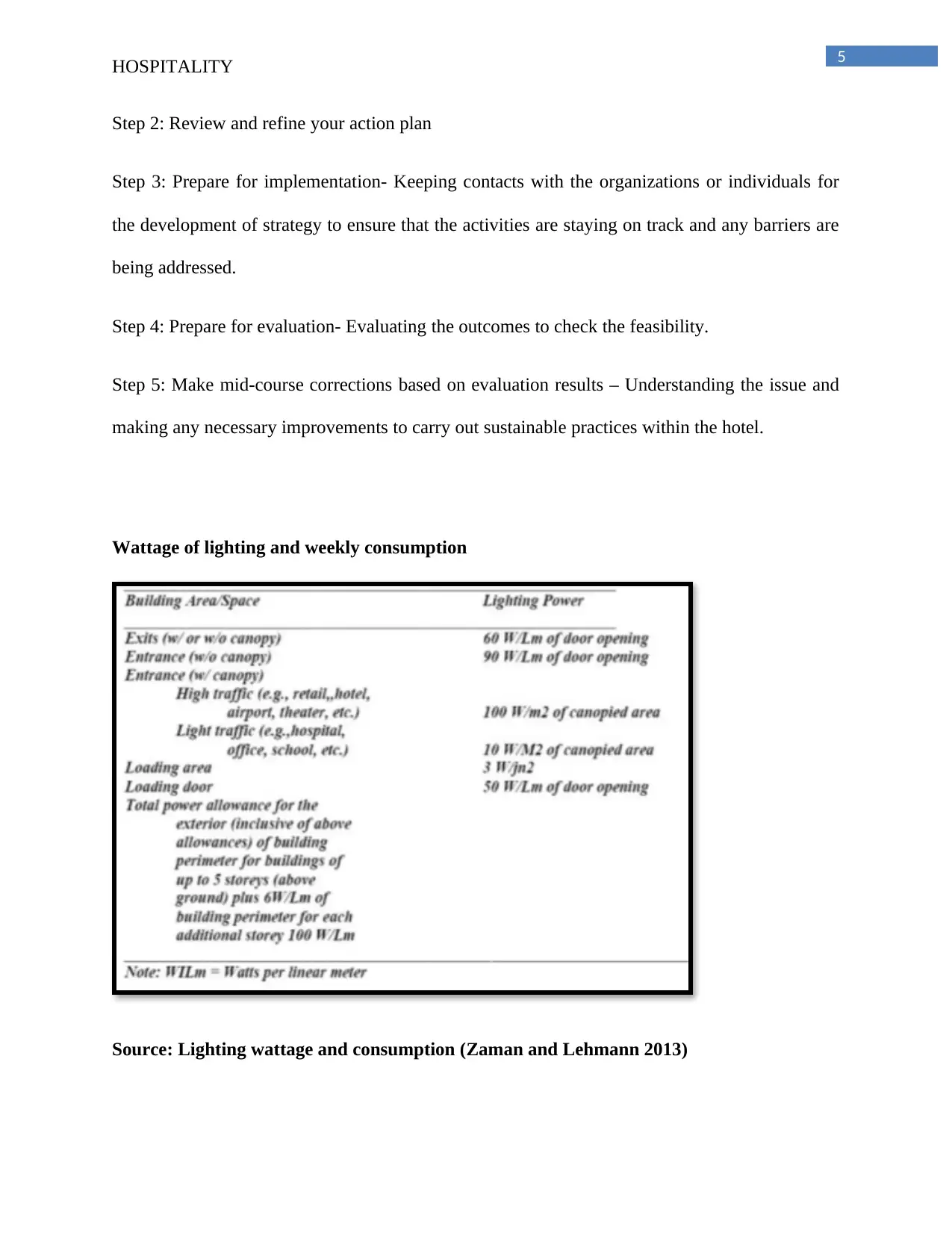
5
HOSPITALITY
Step 2: Review and refine your action plan
Step 3: Prepare for implementation- Keeping contacts with the organizations or individuals for
the development of strategy to ensure that the activities are staying on track and any barriers are
being addressed.
Step 4: Prepare for evaluation- Evaluating the outcomes to check the feasibility.
Step 5: Make mid-course corrections based on evaluation results – Understanding the issue and
making any necessary improvements to carry out sustainable practices within the hotel.
Wattage of lighting and weekly consumption
Source: Lighting wattage and consumption (Zaman and Lehmann 2013)
HOSPITALITY
Step 2: Review and refine your action plan
Step 3: Prepare for implementation- Keeping contacts with the organizations or individuals for
the development of strategy to ensure that the activities are staying on track and any barriers are
being addressed.
Step 4: Prepare for evaluation- Evaluating the outcomes to check the feasibility.
Step 5: Make mid-course corrections based on evaluation results – Understanding the issue and
making any necessary improvements to carry out sustainable practices within the hotel.
Wattage of lighting and weekly consumption
Source: Lighting wattage and consumption (Zaman and Lehmann 2013)
⊘ This is a preview!⊘
Do you want full access?
Subscribe today to unlock all pages.

Trusted by 1+ million students worldwide
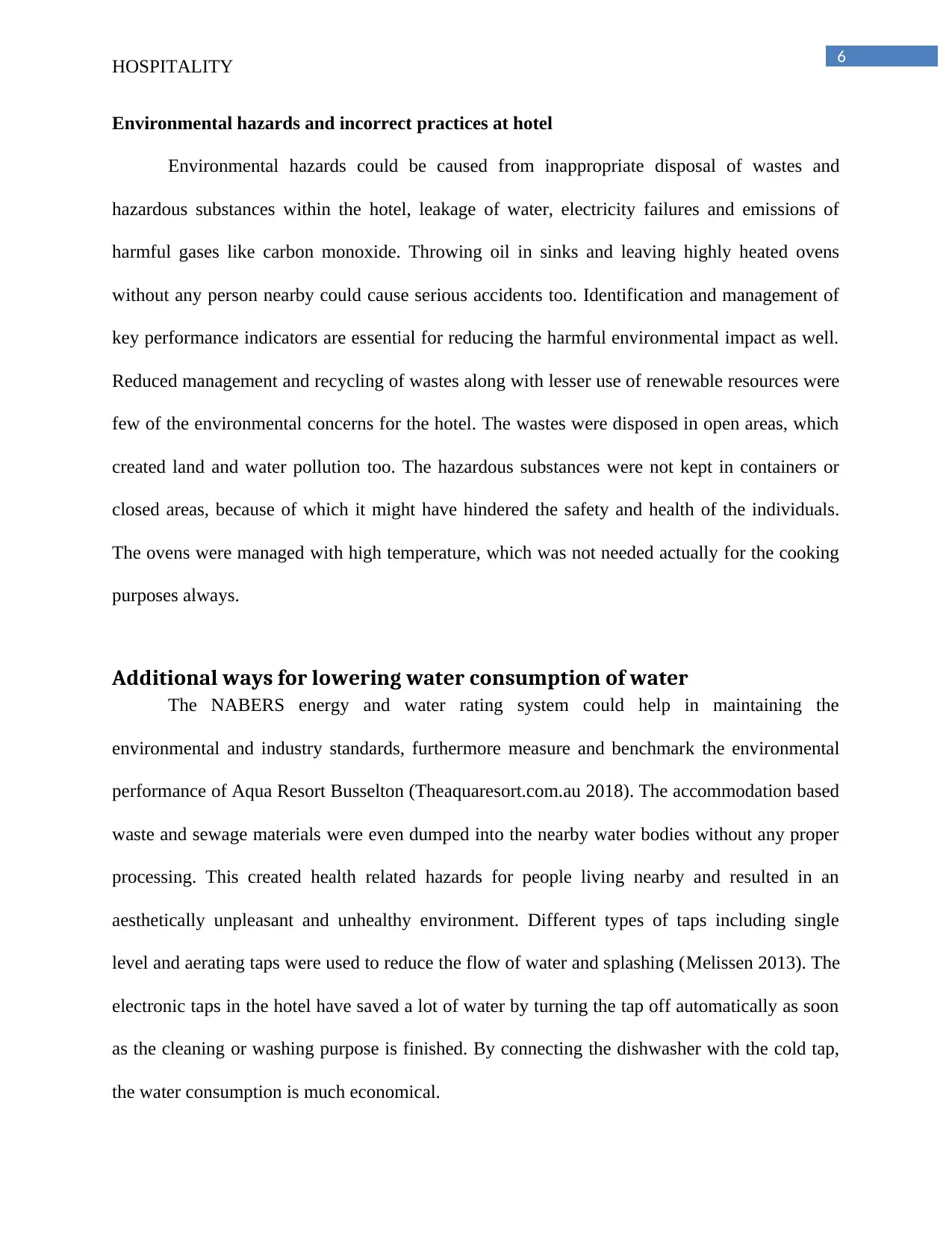
6
HOSPITALITY
Environmental hazards and incorrect practices at hotel
Environmental hazards could be caused from inappropriate disposal of wastes and
hazardous substances within the hotel, leakage of water, electricity failures and emissions of
harmful gases like carbon monoxide. Throwing oil in sinks and leaving highly heated ovens
without any person nearby could cause serious accidents too. Identification and management of
key performance indicators are essential for reducing the harmful environmental impact as well.
Reduced management and recycling of wastes along with lesser use of renewable resources were
few of the environmental concerns for the hotel. The wastes were disposed in open areas, which
created land and water pollution too. The hazardous substances were not kept in containers or
closed areas, because of which it might have hindered the safety and health of the individuals.
The ovens were managed with high temperature, which was not needed actually for the cooking
purposes always.
Additional ways for lowering water consumption of water
The NABERS energy and water rating system could help in maintaining the
environmental and industry standards, furthermore measure and benchmark the environmental
performance of Aqua Resort Busselton (Theaquaresort.com.au 2018). The accommodation based
waste and sewage materials were even dumped into the nearby water bodies without any proper
processing. This created health related hazards for people living nearby and resulted in an
aesthetically unpleasant and unhealthy environment. Different types of taps including single
level and aerating taps were used to reduce the flow of water and splashing (Melissen 2013). The
electronic taps in the hotel have saved a lot of water by turning the tap off automatically as soon
as the cleaning or washing purpose is finished. By connecting the dishwasher with the cold tap,
the water consumption is much economical.
HOSPITALITY
Environmental hazards and incorrect practices at hotel
Environmental hazards could be caused from inappropriate disposal of wastes and
hazardous substances within the hotel, leakage of water, electricity failures and emissions of
harmful gases like carbon monoxide. Throwing oil in sinks and leaving highly heated ovens
without any person nearby could cause serious accidents too. Identification and management of
key performance indicators are essential for reducing the harmful environmental impact as well.
Reduced management and recycling of wastes along with lesser use of renewable resources were
few of the environmental concerns for the hotel. The wastes were disposed in open areas, which
created land and water pollution too. The hazardous substances were not kept in containers or
closed areas, because of which it might have hindered the safety and health of the individuals.
The ovens were managed with high temperature, which was not needed actually for the cooking
purposes always.
Additional ways for lowering water consumption of water
The NABERS energy and water rating system could help in maintaining the
environmental and industry standards, furthermore measure and benchmark the environmental
performance of Aqua Resort Busselton (Theaquaresort.com.au 2018). The accommodation based
waste and sewage materials were even dumped into the nearby water bodies without any proper
processing. This created health related hazards for people living nearby and resulted in an
aesthetically unpleasant and unhealthy environment. Different types of taps including single
level and aerating taps were used to reduce the flow of water and splashing (Melissen 2013). The
electronic taps in the hotel have saved a lot of water by turning the tap off automatically as soon
as the cleaning or washing purpose is finished. By connecting the dishwasher with the cold tap,
the water consumption is much economical.
Paraphrase This Document
Need a fresh take? Get an instant paraphrase of this document with our AI Paraphraser
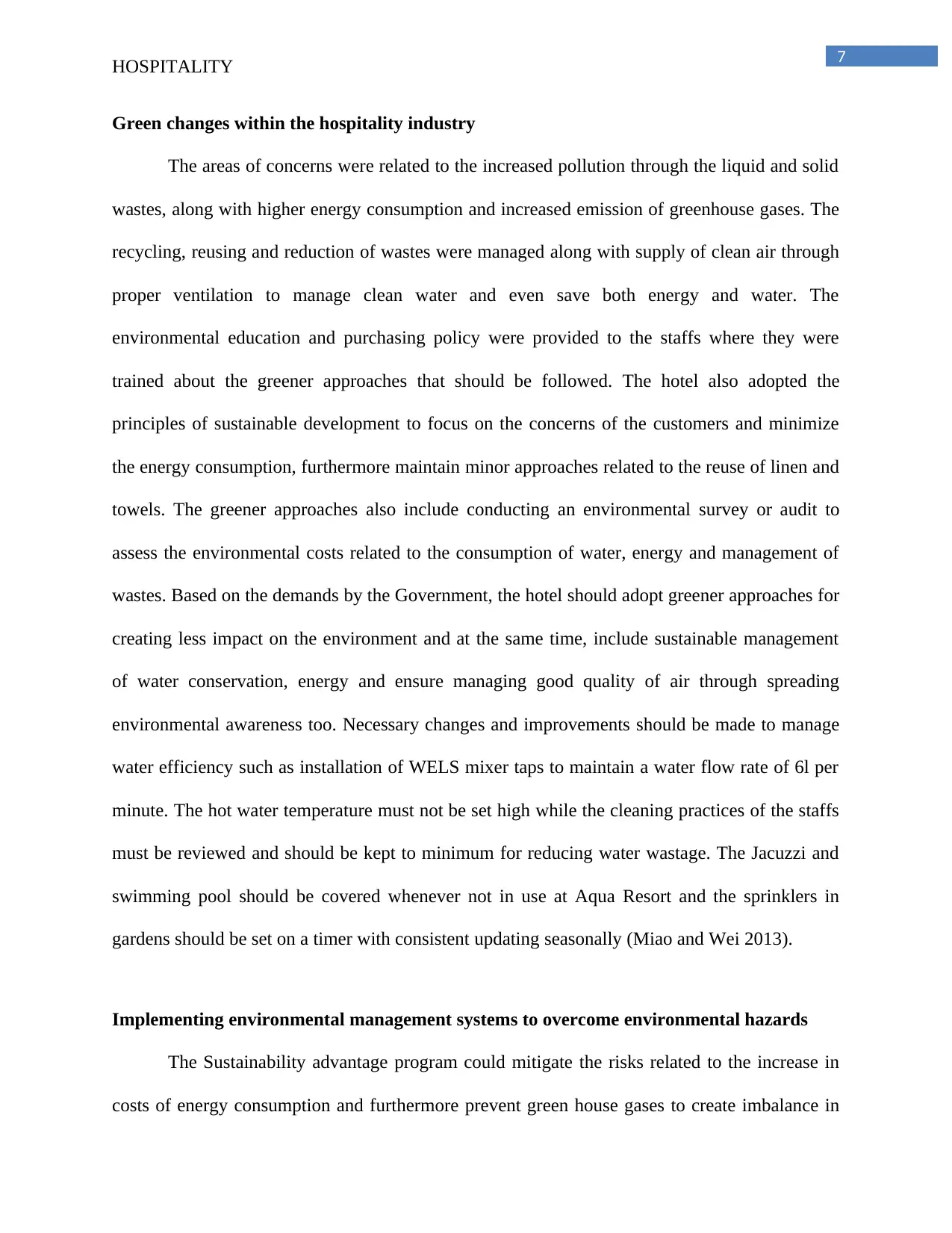
7
HOSPITALITY
Green changes within the hospitality industry
The areas of concerns were related to the increased pollution through the liquid and solid
wastes, along with higher energy consumption and increased emission of greenhouse gases. The
recycling, reusing and reduction of wastes were managed along with supply of clean air through
proper ventilation to manage clean water and even save both energy and water. The
environmental education and purchasing policy were provided to the staffs where they were
trained about the greener approaches that should be followed. The hotel also adopted the
principles of sustainable development to focus on the concerns of the customers and minimize
the energy consumption, furthermore maintain minor approaches related to the reuse of linen and
towels. The greener approaches also include conducting an environmental survey or audit to
assess the environmental costs related to the consumption of water, energy and management of
wastes. Based on the demands by the Government, the hotel should adopt greener approaches for
creating less impact on the environment and at the same time, include sustainable management
of water conservation, energy and ensure managing good quality of air through spreading
environmental awareness too. Necessary changes and improvements should be made to manage
water efficiency such as installation of WELS mixer taps to maintain a water flow rate of 6l per
minute. The hot water temperature must not be set high while the cleaning practices of the staffs
must be reviewed and should be kept to minimum for reducing water wastage. The Jacuzzi and
swimming pool should be covered whenever not in use at Aqua Resort and the sprinklers in
gardens should be set on a timer with consistent updating seasonally (Miao and Wei 2013).
Implementing environmental management systems to overcome environmental hazards
The Sustainability advantage program could mitigate the risks related to the increase in
costs of energy consumption and furthermore prevent green house gases to create imbalance in
HOSPITALITY
Green changes within the hospitality industry
The areas of concerns were related to the increased pollution through the liquid and solid
wastes, along with higher energy consumption and increased emission of greenhouse gases. The
recycling, reusing and reduction of wastes were managed along with supply of clean air through
proper ventilation to manage clean water and even save both energy and water. The
environmental education and purchasing policy were provided to the staffs where they were
trained about the greener approaches that should be followed. The hotel also adopted the
principles of sustainable development to focus on the concerns of the customers and minimize
the energy consumption, furthermore maintain minor approaches related to the reuse of linen and
towels. The greener approaches also include conducting an environmental survey or audit to
assess the environmental costs related to the consumption of water, energy and management of
wastes. Based on the demands by the Government, the hotel should adopt greener approaches for
creating less impact on the environment and at the same time, include sustainable management
of water conservation, energy and ensure managing good quality of air through spreading
environmental awareness too. Necessary changes and improvements should be made to manage
water efficiency such as installation of WELS mixer taps to maintain a water flow rate of 6l per
minute. The hot water temperature must not be set high while the cleaning practices of the staffs
must be reviewed and should be kept to minimum for reducing water wastage. The Jacuzzi and
swimming pool should be covered whenever not in use at Aqua Resort and the sprinklers in
gardens should be set on a timer with consistent updating seasonally (Miao and Wei 2013).
Implementing environmental management systems to overcome environmental hazards
The Sustainability advantage program could mitigate the risks related to the increase in
costs of energy consumption and furthermore prevent green house gases to create imbalance in
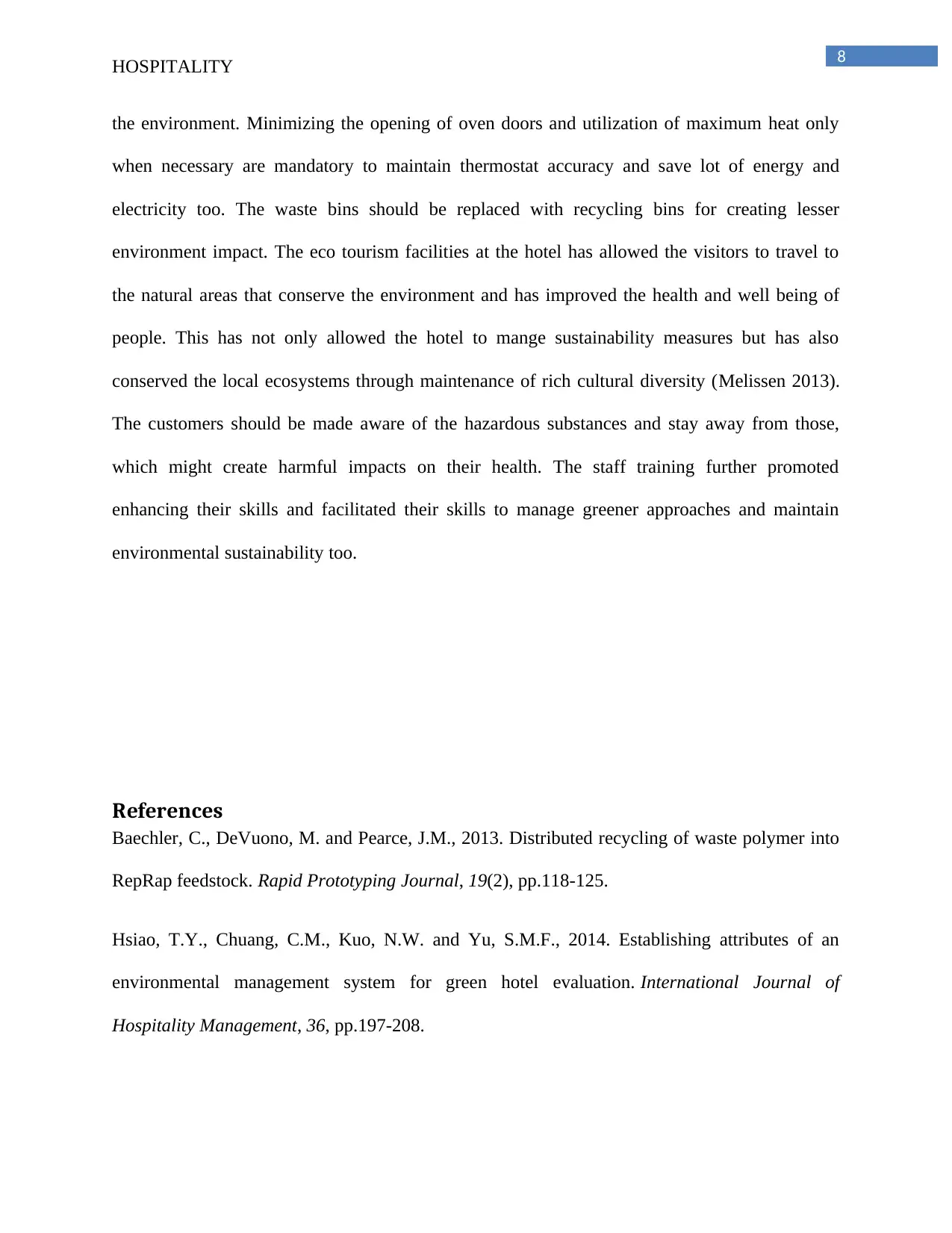
8
HOSPITALITY
the environment. Minimizing the opening of oven doors and utilization of maximum heat only
when necessary are mandatory to maintain thermostat accuracy and save lot of energy and
electricity too. The waste bins should be replaced with recycling bins for creating lesser
environment impact. The eco tourism facilities at the hotel has allowed the visitors to travel to
the natural areas that conserve the environment and has improved the health and well being of
people. This has not only allowed the hotel to mange sustainability measures but has also
conserved the local ecosystems through maintenance of rich cultural diversity (Melissen 2013).
The customers should be made aware of the hazardous substances and stay away from those,
which might create harmful impacts on their health. The staff training further promoted
enhancing their skills and facilitated their skills to manage greener approaches and maintain
environmental sustainability too.
References
Baechler, C., DeVuono, M. and Pearce, J.M., 2013. Distributed recycling of waste polymer into
RepRap feedstock. Rapid Prototyping Journal, 19(2), pp.118-125.
Hsiao, T.Y., Chuang, C.M., Kuo, N.W. and Yu, S.M.F., 2014. Establishing attributes of an
environmental management system for green hotel evaluation. International Journal of
Hospitality Management, 36, pp.197-208.
HOSPITALITY
the environment. Minimizing the opening of oven doors and utilization of maximum heat only
when necessary are mandatory to maintain thermostat accuracy and save lot of energy and
electricity too. The waste bins should be replaced with recycling bins for creating lesser
environment impact. The eco tourism facilities at the hotel has allowed the visitors to travel to
the natural areas that conserve the environment and has improved the health and well being of
people. This has not only allowed the hotel to mange sustainability measures but has also
conserved the local ecosystems through maintenance of rich cultural diversity (Melissen 2013).
The customers should be made aware of the hazardous substances and stay away from those,
which might create harmful impacts on their health. The staff training further promoted
enhancing their skills and facilitated their skills to manage greener approaches and maintain
environmental sustainability too.
References
Baechler, C., DeVuono, M. and Pearce, J.M., 2013. Distributed recycling of waste polymer into
RepRap feedstock. Rapid Prototyping Journal, 19(2), pp.118-125.
Hsiao, T.Y., Chuang, C.M., Kuo, N.W. and Yu, S.M.F., 2014. Establishing attributes of an
environmental management system for green hotel evaluation. International Journal of
Hospitality Management, 36, pp.197-208.
⊘ This is a preview!⊘
Do you want full access?
Subscribe today to unlock all pages.

Trusted by 1+ million students worldwide
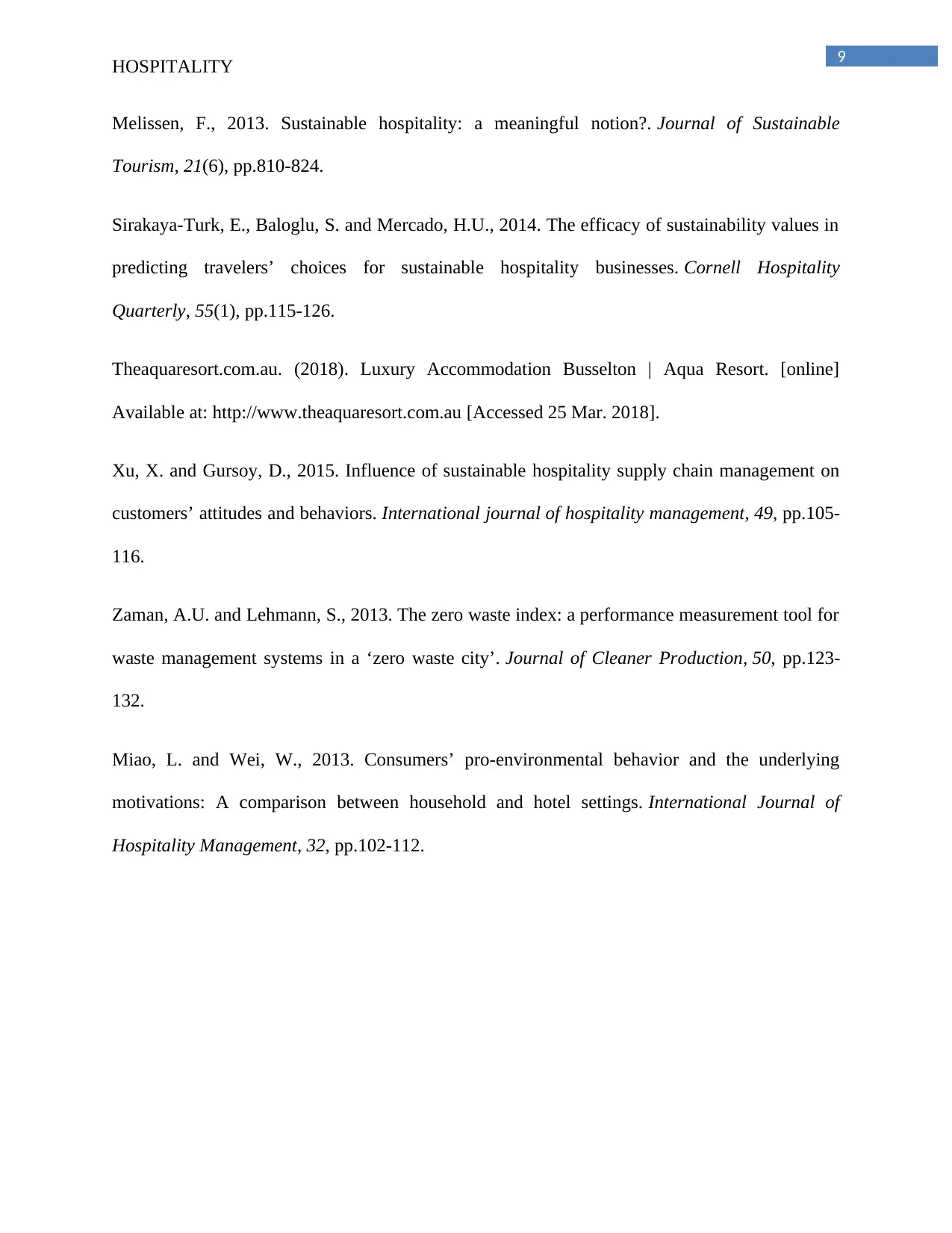
9
HOSPITALITY
Melissen, F., 2013. Sustainable hospitality: a meaningful notion?. Journal of Sustainable
Tourism, 21(6), pp.810-824.
Sirakaya-Turk, E., Baloglu, S. and Mercado, H.U., 2014. The efficacy of sustainability values in
predicting travelers’ choices for sustainable hospitality businesses. Cornell Hospitality
Quarterly, 55(1), pp.115-126.
Theaquaresort.com.au. (2018). Luxury Accommodation Busselton | Aqua Resort. [online]
Available at: http://www.theaquaresort.com.au [Accessed 25 Mar. 2018].
Xu, X. and Gursoy, D., 2015. Influence of sustainable hospitality supply chain management on
customers’ attitudes and behaviors. International journal of hospitality management, 49, pp.105-
116.
Zaman, A.U. and Lehmann, S., 2013. The zero waste index: a performance measurement tool for
waste management systems in a ‘zero waste city’. Journal of Cleaner Production, 50, pp.123-
132.
Miao, L. and Wei, W., 2013. Consumers’ pro-environmental behavior and the underlying
motivations: A comparison between household and hotel settings. International Journal of
Hospitality Management, 32, pp.102-112.
HOSPITALITY
Melissen, F., 2013. Sustainable hospitality: a meaningful notion?. Journal of Sustainable
Tourism, 21(6), pp.810-824.
Sirakaya-Turk, E., Baloglu, S. and Mercado, H.U., 2014. The efficacy of sustainability values in
predicting travelers’ choices for sustainable hospitality businesses. Cornell Hospitality
Quarterly, 55(1), pp.115-126.
Theaquaresort.com.au. (2018). Luxury Accommodation Busselton | Aqua Resort. [online]
Available at: http://www.theaquaresort.com.au [Accessed 25 Mar. 2018].
Xu, X. and Gursoy, D., 2015. Influence of sustainable hospitality supply chain management on
customers’ attitudes and behaviors. International journal of hospitality management, 49, pp.105-
116.
Zaman, A.U. and Lehmann, S., 2013. The zero waste index: a performance measurement tool for
waste management systems in a ‘zero waste city’. Journal of Cleaner Production, 50, pp.123-
132.
Miao, L. and Wei, W., 2013. Consumers’ pro-environmental behavior and the underlying
motivations: A comparison between household and hotel settings. International Journal of
Hospitality Management, 32, pp.102-112.
1 out of 10
Related Documents
Your All-in-One AI-Powered Toolkit for Academic Success.
+13062052269
info@desklib.com
Available 24*7 on WhatsApp / Email
![[object Object]](/_next/static/media/star-bottom.7253800d.svg)
Unlock your academic potential
Copyright © 2020–2026 A2Z Services. All Rights Reserved. Developed and managed by ZUCOL.





